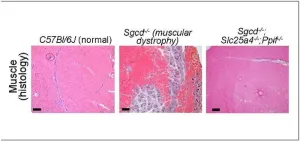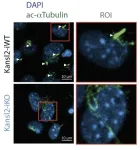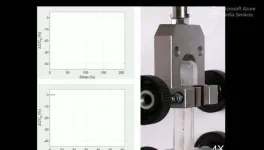(Press-News.org) A new study led by researchers at Karolinska Institutet in Sweden has examined how T cells of the immune system are affected by weightlessness. The results, which are published in the journal Science Advances, could explain why astronauts’ T cells become less active and less effective at fighting infection.
The next steps in the exploration of space are human missions to the moon and to Mars. Space is an extremely hostile environment that poses threats to human health. One such threat is changes to the immune system that occur in astronauts while in space and that persist after their return to Earth. This immune deficiency can leave them more vulnerable to infection and lead to the reactivation of latent viruses in the body.
“If astronauts are to be able to undergo safe space missions, we need to understand how their immune systems are affected and try to find ways to counter harmful changes to it,” says study leader Lisa Westerberg, principal researcher at the Department of Microbiology, Tumor and Cell Biology, Karolinska Institutet. “We’ve now been able to investigate what happens to T cells, which are a key component of the immune system, when exposed to weightless conditions.”
In the study, the researchers have tried to simulate weightlessness in space using a method called dry immersion. This involves a custom-made waterbed that tricks the body into thinking it is in a weightless state. The researchers examined T cells in the blood of eight healthy individuals for three weeks of exposure to simulated weightlessness. Blood analyses were performed before the experiment started, at 7, 14 and 21 days after the start, and at 7 days after the experiment ended.
They found that the T cells significantly changed their gene expression – that is to say, which genes were active and which were not – after 7 and 14 days of weightlessness and that the cells became more immature in their genetic programme. The greatest effect was seen after 14 days.
“The T cells began to resemble more so-called naïve T cells, which have not yet encountered any intruders. This could mean that they take longer to be activated and thus become less effective at fighting tumour cells and infections. Our results can pave the way for new treatments that reverse these changes to the immune cells’ genetic programme,” says Carlos Gallardo Dodd, PhD student at the Department of Microbiology, Tumor and Cell Biology, Karolinska Institutet and shared first author with researchers Christian Oertlin and Julien Record at the same department.
After 21 days, the T cells had “adapted” their gene expression to weightlessness so that it had almost returned to normal, but analyses carried out seven days after the experiment ended showed that the cells had regained some of the changes.
The researchers now plan to use Esrange Space Centre’s sounding rocket platform in Kiruna, Sweden, to study how T cells behave in weightless conditions and how their function is affected.
The study was financed by the Swedish National Space Agency, the Swedish Research Council and Karolinska Institutet and was conducted in close collaboration with Claudia Kutter’s research group at Karolinska Institutet/SciLifeLab and collaboration partners at IBMP Moscow and New York University Abu Dhabi. There are no reported conflicts of interest.
Publication: “Exposure of volunteers to microgravity by dry immersion bed over 21 days results in gene expression changes and adaptation of T cells”. Carlos J. Gallardo-Dodd, Christian Oertlin, Julien Record, Rômulo G. Galvani, Christian Sommerauer, Nikolai V. Kuznetsov, Evangelos Doukoumopoulos, Liaqat Ali, Mariana M.S. Oliveira, Christina Seitz, Mathias Percipalle, Tijana Nikić, Anastasia A. Sadova, Sofia M. Shulgina, Vjacheslav A. Shmarov, Olga V. Kutko, Daria D. Vlasova, Kseniya D. Orlova, Marina P. Rykova, John Andersson, Piergiorgio Percipalle, Claudia Kutter, Sergey A. Ponomarev, Lisa S. Westerberg. Science Advances, online 25 August 2023, doi: 10.1126/sciadv.adg1610.
END
How being in space impairs astronauts’ immune system
2023-08-25
ELSE PRESS RELEASES FROM THIS DATE:
Mitochondria pore emerges as potential key to managing muscular dystrophies
2023-08-25
Ever since the Jerry Lewis telethons began in the 1960s, millions of people have become familiar with an otherwise rare disease called muscular dystrophy (MD).
The medical world has learned much over the ensuing years, including that more than 30 closely related disorders exist that can produce the gradual muscle degeneration that steals a child’s ability to walk and eventually disrupts other organ functions. An estimated 250,000 people in the U.S. are living with a muscular dystrophy. While many are living longer lives thanks to improved treatments, no cure has been found.
Now an eye-opening study ...
Unlocking the secrets of cell antennas
2023-08-25
Cilia are thin, eyelash-like extensions on the surface of cells. They perform a wide variety of functions, acting as mechanosensors or chemosensors, and play a crucial role in many signaling pathways. In the last few decades, the organelle has undergone a remarkable, but at the same time sinister, career transformation. It evolved from an organelle whose relevance was unclear to becoming a central player in the pathogenesis of a large group of diseases. These so-called ciliopathies are associated with a wide range of symptoms, including hearing loss, visual impairment, obesity, kidney disease, and mental disability. Different gene mutations impair cilia formation, ...
How origami might inform disease diagnoses
2023-08-25
Researchers at the USC Viterbi School of Engineering looked to origami to create new sensors that could someday be employed to detect deformations in organs and also for use in wearables and soft robotics.
Their paper, “High-Stretchability and Low-Hysteresis Strain Sensors Using Origami-Inspired 3D Mesostructures,” featured in Science Advances explains how USC researchers Hangbo Zhao, Xinghao Huang, Liangshu Liu, Yung Hsin Lin, Rui Feng, Yiyang Shen, and Yuanning Chang developed “stretchable strain sensors,” ...
Weight loss medication benefits patients with heart failure and obesity
2023-08-25
Amsterdam, Netherlands – 25 Aug 2023: Semaglutide improves heart failure-related symptoms and physical function and results in greater weight loss compared with placebo in patients with heart failure with preserved ejection fraction (HFpEF) and obesity, according to late breaking research presented in a Hot Line session today at ESC Congress 2023.1
Approximately half of patients with heart failure in the community have HFpEF.2 Most patients with HFpEF are overweight or obese, and growing evidence suggests that obesity and excess adiposity are not simply comorbidities, ...
Oral anticoagulation is not effective in patients with atrial high-rate episodes
2023-08-25
Amsterdam, Netherlands – 25 Aug 2023: Blood thinners (anticoagulants) cause bleeding without preventing stroke in patients with atrial high rate episodes (AHRE), but without electrocardiogram (ECG)-diagnosed atrial fibrillation, according to late breaking research presented in a Hot Line session today at ESC Congress 2023 and simultaneously published in the New England Journal of Medicine.1
Anticoagulants prevent strokes in patients with atrial fibrillation but are not effective in those without atrial fibrillation, for example in patients with ...
Colchicine fails to reduce primary outcomes in COP-AF trial but encouraging signals found
2023-08-25
Amsterdam, Netherlands – 25 Aug 2023: Colchicine does not significantly reduce perioperative atrial fibrillation (AF) or myocardial injury after non-cardiac surgery (MINS) in patients undergoing major non-cardiac thoracic surgery, according to late breaking research presented in a Hot Line session today at ESC Congress 2023.1
Perioperative AF occurs in approximately 10% of patients after major thoracic surgery, while MINS has an incidence of about 20% in the same patient population.2 Patients with perioperative AF and MINS have a poor prognosis.3,4 High levels ...
First ESC Guidelines covering all acute coronary syndromes published today
2023-08-25
Amsterdam, Netherlands – 25 Aug 2023: The European Society of Cardiology (ESC) Guidelines on acute coronary syndromes are published online today in European Heart Journal.1 The document covers the management of unstable angina and all types of acute myocardial infarction.
“Time is critical in acute coronary syndromes. When an artery supplying the heart with blood becomes blocked, the quicker we open the artery and restore flow, the less damage occurs to the heart muscle,” said Guidelines task force ...
First international guidelines on heart muscle diseases published today
2023-08-25
Amsterdam, Netherlands – 25 Aug 2023: The European Society of Cardiology (ESC) Guidelines on cardiomyopathies are published online today in European Heart Journal.1 This is the first international guideline document to include all cardiomyopathy subtypes, and the first time that specific recommendations are made for cardiomyopathies other than hypertrophic cardiomyopathy.
“This pioneering document reflects the advances in genetics and cardiac imaging and the advent of new treatments that target specific causes of disease,” said Guidelines task force chairperson Dr. Elena Arbelo of the Hospital Clinic, University of Barcelona, Spain.
“At the ...
Recommendations to reduce cardiovascular risk in patients with diabetes published today
2023-08-25
Amsterdam, Netherlands – 25 Aug 2023: Patients with type 2 diabetes are more than twice as likely to develop cardiovascular disease (CVD) than their healthy peers. Advice to lower that risk is launched today in the 2023 European Society of Cardiology (ESC) Guidelines for the management of cardiovascular disease in patients with diabetes, published in European Heart Journal.1
“Patients with type 2 diabetes have a two- to four-fold higher risk of coronary artery disease, stroke, heart failure, atrial fibrillation and peripheral artery disease compared to those without type 2 diabetes and when CVD occurs, the prognosis ...
Patients urged to be vigilant about cardiac infections
2023-08-25
Amsterdam, Netherlands – 25 Aug 2023: Patients with specific cardiac conditions such as valvular heart disease and congenital abnormalities, or those requiring a pacemaker, should practice good dental and skin hygiene to help prevent rare but potentially deadly infections of the heart’s inner lining and valves, according to European Society of Cardiology (ESC) Guidelines on infective endocarditis, published online today in European Heart Journal.1
“Infective endocarditis is an uncommon but very serious disease that can present with ...


